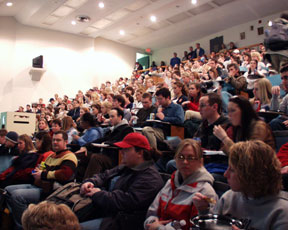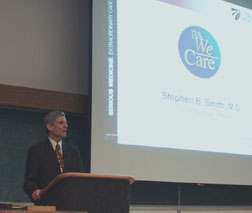 Patient safety and reducing the likelihood of human medical errors was the focal point of this year’s Professionalism Seminar for future health care professionals.
Patient safety and reducing the likelihood of human medical errors was the focal point of this year’s Professionalism Seminar for future health care professionals.
“There needs to be an open blanket policy to make it OK to say something does not feel right,” said Stephen Smith, M.D., chief medical officer for The Nebraska Medical Center. “Each of us here has a responsibility to the patient.”
More than 400 UNMC students from all disciplines attended the Feb. 25 seminar, which was broadcasted via satellite to students in Lincoln, Kearney and Scottsbluff. The UNMC Alumni Board sponsored the event.
“The seminar provided food for thought that will hopefully help students work together constructively to improve our ability to take care of patients professionally, efficiently and with minimal chance for error,” said Gerald Moore, M.D., chairman of the Professionalism Seminar Committee and a professor in the College of Medicine.
“I am more aware of the power which lies in my hands,” first-year medical student Sabrina Seib said following the seminar. “His presentation was extremely powerful.”
 In November 1999, the Institute of Medicine released a report estimating that as many as 98,000 patients die as the result of medical errors in hospitals each year. The Nebraska Medical Center, however, has incorporated measures to reduce the occurrence of human errors, he said.
In November 1999, the Institute of Medicine released a report estimating that as many as 98,000 patients die as the result of medical errors in hospitals each year. The Nebraska Medical Center, however, has incorporated measures to reduce the occurrence of human errors, he said.
The hospital is using the Patient Safety Network, which allows for instantaneous reporting, he said. The online system also allows a network of hospitals to review all errors, which helps identify trends in types of errors.
The hospital staff also engages in critical event analysis, asking why an error occurred and what can be done to prevent it from happening again. “There needs to be a break-down in the hierarchy of hospitals,” Dr. Smith said, noting everyone must feel comfortable speaking out if something seems wrong.
Through a video, students heard from Sorrel King, whose 2-year-old daughter Josie died from severe dehydration and misuse of narcotics at the hands of her care givers at Johns Hopkins Hospital. Although King was mortified that such errors could occur in one of the country’s top hospitals, she realized people make mistakes, and said: “Human errors need human solutions.”
Dr. Smith told the group that open communication is critical within hospital settings.
First-year nursing student Marti Burke agreed. “I should always keep questioning until I am certain that my patient is taken care of to the best of my ability, and I am satisfied with the result,” she said.